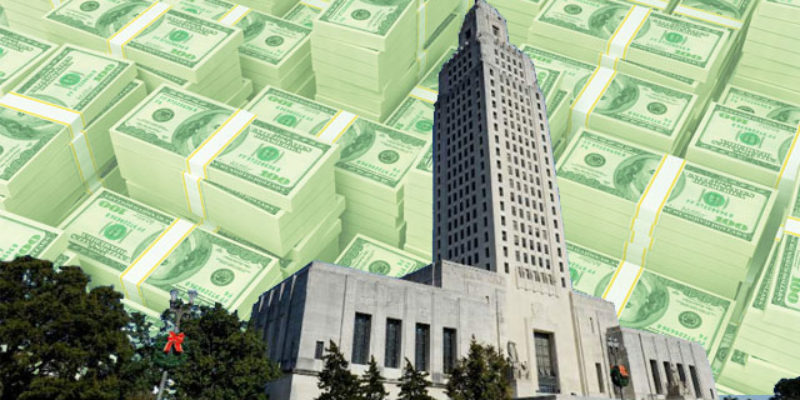Mistakes made in fabricating the fiscal year 2016 budget for Louisiana provide lessons for what should come next year to shape the 2017 edition.
Not that legislators or Gov. Bobby Jindal had an easy task at hand. The FY 2015 budget the day it went into effect started about $1 billion short, or four percent, for FY 2016. This did not count known spending growth demands (such as in health care driven by federal grant strictures) nor subsequent coming up short in forecast revenues (about $275 million worth), largely because of the steep decline in the energy sector (although almost half of that was recovered by an unseen surplus developing during the session).
In previous years, funds sweeps – where monies for a particular purpose had pooled but lack of the need for which they were intended built up their balances then made accessible for other purposes by appropriation – had made up much of the imbalance. But this year, a combination of the larger size of the deficit plus the deterioration of these funds’ positions (such as with the Medicaid Trust Fund for the Elderly, which was depleted in time for a constitutional amendment to kick in locking in reimbursement rates for nursing homes funds for which had been drawn from the fund) made this strategy unable to close the gap entirely, with only around $135 million sorted out this way.
So, policy-makers opted to raise taxes around $761 million, with just over $100 million of that in effect basically only for this year and all but about $100 million more due to expire by the end of decade. These came in the form of reducing amounts that often came in refund form beyond tax liability, but some also that affected actual liability. However, roughly $400 million more besides the termination of the two tax exception suspensions essentially after this fiscal year remains uncovered. If nothing else changes, including an unrealistic standstill government in areas like health care, this means that the decidedly higher taxes continuing into next year plus funds sweeps still may not produce enough revenue to pay for all of the spending presently believed needed.
Changing this dynamic first begins with the recognition that Louisiana does not have a revenue problem, but a spending problem. In constant dollars, in the first decade of the century it saw a 63 percent per capita growth in spending, by far the most of any state, leaving it by 2013 ranked 22nd in per capita spending. At the same time, over that period it had the lowest aggregate tax burden of any state. Simply, for the level of taxation citizens demanded, government spending has outstripped that. The question remaining is whether they expect more than they are willing to pay, or if it is poor decision-making that induces wasteful inefficiency into government, or both, and if they are willing to pony up more of what they earn to reach some level of spending they desire regardless of the cause.
A second facet additionally demands addressing, that, after the actions of this year’s session, now fully 86 percent of spending is dedicated somewhere (this includes federal funds and self-generated revenues, which always are tied to a certain purpose), leaving a scant $3.5 billion not locked in somewhere, making that amount about as much as is dedicated now by statute. Unlike constitutional dedications, which require amending the Constitution, these may be undone by changing the law with legislative majorities. Having so much dedicated contributes to inefficiency in matching resources to needs, leading to the question of whether all dedications truly are necessary and to what degree.
And, finally, as part of that, while altering tax exceptions made up a large part of the past session, choices made with these lacked coordination or even rationality, with hacking – or not –occurring in areas most convenient and political, not with any systemic study of these costs and benefits. This approach did not answer whether those that exist are cost effective and/or serve an important non-pecuniary purpose, although the Legislature managed some progress upon its passing of HB 749 by state Rep. Roy Burrell that would launch a review of tax credits.
To answer these questions, only a radical overhaul of the state’s fiscal structure can suffice. Each announced candidate for governor has declared an intent to call a special session soon after inauguration to address fiscal concerns, and that can serve as the vehicle to accomplish this. All need to commit this additional gathering of legislators prior to the regular session to discovering state spending levels congruent with the people’s tax willingness, ranking needs only on the basis of priorities and not just going along with what’s in place, and what sensible and/or vital mission-performing tax credits need retention and/or alteration that can serve as a springboard for a far less-complicated, exception-ridden tax code the raises revenue efficiently. If required to amend the Constitution as part of the solution, that may happen during the spring election date around the start of the regular session.
Failure to follow this course of action risks putting the state right back to where it was in this year’s budgeting, another year of inferior fiscal management, and a continuance of chronic underserving of the citizenry.
Advertisement
Advertisement

